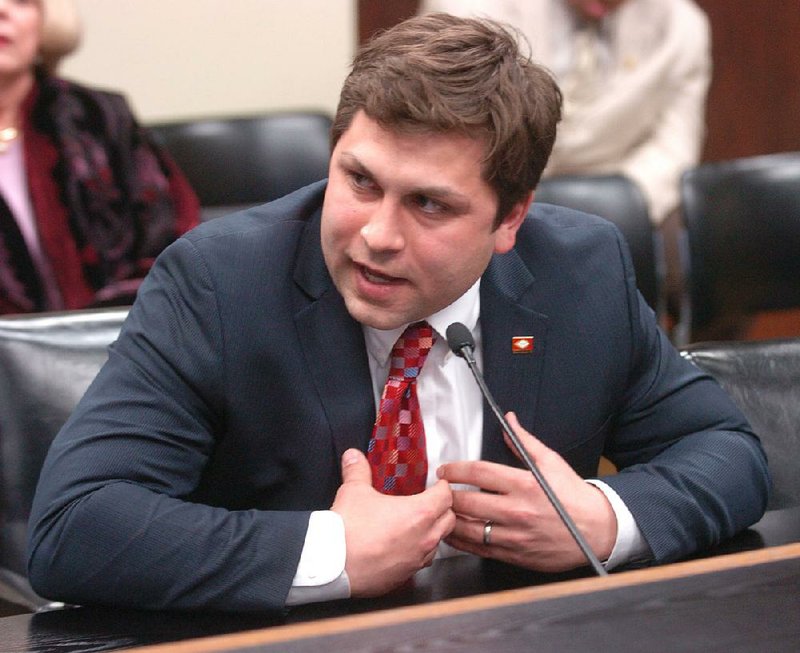LITTLE ROCK — Covering up to 250,000 poor Arkansans by expanding Medicaid with federal help will make Arkansas more business friendly, especially for small companies, says Gov. Mike Beebe.
Small-business owners don’t favor expansion, however, and many of their low wage workers will be able to buy coverage on the state’s health-insurance exchange, says an influential Republican state senator.
READ MORE
Meanwhile, the Arkansas State Chamber of Commerce/Associated Industries of Arkansas has remained on the fence about the most high-profile issue of the legislative session. And it might just stay there, Randy Zook, the organization’s president and chief executive officer, said Friday.
“We don’t have one,” Zook said when asked for its stance on expanding the state’s Medicaid rolls.
Allowed by the federal Patient Protection and Affordable Care Act - but not required after a 2012 ruling by the U.S. Supreme Court - state lawmakers are now wrestling with whether the state should expand its $5 billion program that already covers about 780,000 Arkansans.
Currently, the only expansion option is to cover individuals making up to $15,415 annually or 138 percent of the federal poverty level.
Republicans hold out hopes for a federal reversal on that position and an opening for a “partial” expansion, perhaps just to 100 percent of the federal poverty level, or $11,170 in annual earnings for an individual.
Beebe has promised to take up the possibility of a smaller expansion with U.S. Department of Health and Human Services Secretary Kathleen Sebelius at a late February meeting in Washington, D.C.
The uncertainty as to what Medicaid expansion will look like has played into the state chamber’s reticence. When asked if the state’s premier business lobbying group would eventually come down on one side of the issue, Zook said: “I don’t know.”
“It’s a moving target, obviously. It’s complex. The more we peel the onion, the more we learn. But we think the Legislature will reach a decision before the end of this session, hopefully,” he said.
Recently, more Republicans have said, privately and publicly, that a special session devoted solely to Medicaid expansion is an attractive idea. Before the regular session, which began last week, Beebe said he wasn’t inclined to call back lawmakers for a Medicaid-only gathering.
The federal government will pay the full tab for expansion until 2017. By 2020, the state will pay 10 percent of the cost. Estimates vary for the state’s share in 2020. In November, the Arkansas Department of Human Services estimated that the approximately $133 million in state dollars spent on new enrollees would be offset by about $180 million in savings.
Those savings would come from fewer dollars spent on uninsured people in hospitals and clinics, additional tax revenue sparked by an influx of federal cash and shifting some state Medicaid recipients to the more generously funded federal expansion program.
But last week, Beebe used a more conservative July estimate by the Department of Human Services that predicted somewhere around $5 million in net expansion costs to the state by 2020.
Whatever the price tag in seven years, a bigger share of healthy “blue collar” Arkansas workers with Medicaid coverage will bolster the state’s economy and help grow small business, said Matt DeCample, Beebe’s spokesman.
Under the new health-care law, businesses with fewer than 50 employees won’t be required to offer insurance. And most businesses with fewer than 100 employees can let those workers purchase exchange policies without penalty. Contrary to some misperceptions, DeCample said, small businesses won’t take a financial hit under the Affordable Care Act.
If they do offer insurance and their wages average under $50,000, they may qualify for federal tax credits.
That covers 95 percent of Arkansas businesses, DeCample said.
“A bigger portion of their workers will be healthier because they have insurance. And these are businesses - a lot of them - who either never offered insurance or had to drop it because of high costs,” DeCample said.
Insured, healthy employees will spark native entrepreneurs and attract their out-of-state counterparts, Beebe has argued.
Searcy Republican Jonathan Dismang doesn’t buy it. Dismang, a member of the Senate Public Health, Welfare and Labor Committee, said he has yet to meet a small-business owner in his district who favors expansion. Instead, he said, they fear a future increase in state taxes when the federal aid recedes.
Dismang said that a full time, state minimum-wage employee earning $6.25 an hour and $13,000 a year would qualify for an insurance exchange policy even if the state turns down Medicaid expansion. Federal subsidies will limit their insurance premiums on exchange policies to 2 percent of income.
“They’ll receive a good subsidy. They’ll be covered,” Dismang said. “If we do nothing, they’re at a pretty good position there.”
If Arkansas is the only state in the region to expand, it might be a competitive advantage, DeCample said, adding that if the state lags behind its neighbors on expansion, it might be hurt economically.
The real question is what the states surrounding Arkansas decide to do, Zook said.
“That’s the challenge. It depends on what everybody else has done,” Zook said.
So far, Texas, Oklahoma, Mississippi and Louisiana appear opposed to expansion. In Missouri and Tennessee, the politics seem more fluid.
In Arkansas, Zook said he’s been talking - a lot - with providers, lawmakers, large employers and insurers.
“There are lots of conversations going on,” he said.
Front Section, Pages 1 on 01/20/2013

